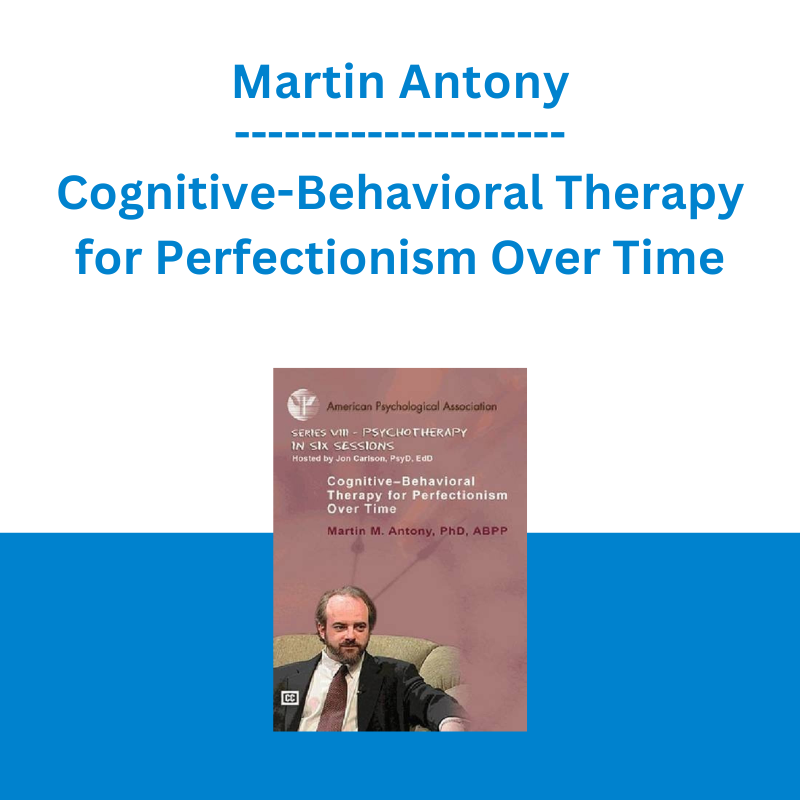*** Proof of Product ***
Exploring the Essential Features of “Martin Antony – Cognitive-Behavioral Therapy for Perfectionism Over Time”
Description
In Cognitive–Behavioral Therapy for Perfectionism Over Time, Dr. Martin M. Antony demonstrates his approach to working with clients wrestling with issues surrounding maladaptive perfectionism. Perfectionism can be defined as a tendency to set standards that are unreasonably high, and to measure an individual’s worth in terms of their ability to meet these standards. Typically, these perfectionistic standards are applied to oneself. Perfectionism is sometimes associated with anxiety or related disorders, and therefore resolving a client’s anxiety may result in a decrease in more debilitating manifestations of perfectionism.
In this series of six sessions, Dr. Antony works with a young woman who is completing a graduate degree in psychology. She strives for perfection in many areas, including her school work and her family life. She is overly concerned with organizing, planning, and succeeding at everything she does, and also has occasional panic attacks and issues concerning her body image. In these sessions, Dr. Antony helps her to challenge thoughts about not meeting her goals and to learn to deal with the resulting stress rather than giving in to her drive to be perfect.
Approach
Dr. Antony’s primary approach to treatment is cognitive–behavioral therapy, and his work is generally in the area of anxiety disorders (e.g., social anxiety disorder, obsessive–compulsive disorder, panic disorder, generalized anxiety disorder, specific phobia) and related conditions (e.g., perfectionism, hypochondriasis, body dysmorphic disorder).
Dr. Antony tends to use exposure-based strategies for dealing with fears of situations, objects, physical sensations, and thoughts. In addition, he uses cognitive strategies to teach clients to challenge their anxious thoughts and to replace them with more realistic interpretations and predictions regarding the situations they fear. Finally, relaxation-based strategies (e.g., progressive muscle relaxation, breathing retraining) are used to help clients to cope with generalized anxiety and stress.
Contributor bios
Martin M. Antony, PhD, is professor in the Department of Psychology at Ryerson University in Toronto, Ontario. He is also director of Research at the Anxiety Treatment and Research Centre at St. Joseph’s Healthcare in Hamilton, Ontario.
Dr. Antony has published 20 books and more than 100 scientific articles and book chapters in the areas of anxiety disorders and cognitive–behavior therapy. His work has been recognized by awards from the Society of Clinical Psychology (Division 12 of the American Psychological Association), the Canadian Psychological Association, and the Anxiety Disorders Association of America.
Suggested resources
How to use the Theories of Psychotherapy Series® in combination with APA Videos
- Antony, M. M., & Swinson, R. P. (2000). Phobic disorders and panic in adults: A guide to assessment and treatment. Washington, DC: American Psychological Association.
- Antony, M. M., & Swinson, R. P. (2008). When perfect isn’t good enough: Strategies for coping with perfectionism (2nd ed.). Oakland, CA: New Harbinger Publications.
- Antony, M. M., Purdon, C., & Summerfeldt, L. J. (2007). Psychological treatment of OCD: Fundamentals and beyond. Washington, DC: American Psychological Association.
- Antony, M. M., & Rowa, K. (2008). Social anxiety disorder: Psychological approaches to assessment and treatment. Göttingen, Germany: Hogrefe.
- Antony, M. M., Ledley, D. R., & Heimberg, R. G. (Eds.). (2005). Improving outcomes and preventing relapse in cognitive–behavioral therapy. New York: Guilford.
- Ashbaugh, A., Antony, M. M., Liss, A., Summerfeldt, L. J., McCabe, R. E., & Swinson, R. P. (2007). Changes in perfectionism following cognitive–behavioral treatment for social phobia. Depression and Anxiety, 24, 169–177.
- Barlow, D. H. (Ed.). (2008). Clinical handbook of psychological disorders (4th ed.). New York: Guilford.
- Dugas, M. J., & Robichaud, M. (2007). Cognitive–behavioral treatment for generalized anxiety disorder. New York: Routledge.
- Flett, G. L., & Hewitt, P. L. (Eds.). (2002). Perfectionism: Theory, research, and treatment. Washington, DC: American Psychological Association.
- Pleva, J., & Wade, T. D. (2007). Guided self-help versus pure self-help for perfectionism: A randomised controlled trial. Behaviour Research and Therapy, 45, 849–861.
- Riley, C., Lee, M., Fairburn, C. G., & Shafran, R. (in press). A randomised controlled trial of cognitive–behaviour therapy for clinical perfectionism: A preliminary study. Behaviour Research and Therapy.
APA Videos
- Behavioral Therapy Over Time
Martin M. Anthony
- Cognitive–Behavioral Therapy for Clients With Anxiety and Panic
Bunmi O. Olatunji
- Cognitive–Behavioral Therapy for Clients With Multiple Problems
Gayle Y. Iwamasa
- Cognitive–Behavioral Therapy for Specific Phobias
Michael A. Tompkins
- Cognitive Therapy
Judith S. Beck
- Obsessive–Compulsive Behavior
Martin M. Antony
- Rational Emotive Behavior Therapy Over Time
Ann Vernon
APA Book
- Perfectionism: Theory, Research, and Treatment
Edited by Gordon L. Flett and Paul L. Hewitt
Magination Press Books
- Nobody’s Perfect: A Story for Children About Perfectionism
Ellen Flanagan Burns
- What to Do When You Worry Too Much: A Kid’s Guide to Overcoming Anxiety
Dawn Huebner; Illustrated by Bonnie Matthews
- What to Do When Your Brain Gets Stuck: A Kid’s Guide to Overcoming OCD
Dawn Huebner; Illustrated by Bonnie Matthews
Companion products
- Cognitive-Behavioral Therapy
In this revised edition of Cognitive Behavioral Therapy, Michelle G. Craske provides vital updated coverage of to the literature that explores the theory, history, therapy process, primary change mechanisms, and empirical basis of the approach, as well as likely future developments.
Please see the full list of alternative group-buy courses available here: https://lunacourse.com/shop/










 Fred Haug - Virtual Wholesaling Simplified
Fred Haug - Virtual Wholesaling Simplified  Toshko Raychev - Profit System + ITF Assistant
Toshko Raychev - Profit System + ITF Assistant  Forexmentor - Recurring Forex Patterns
Forexmentor - Recurring Forex Patterns  George Fontanills & Tom Gentile - Optionetics Wealth Without Worry Course
George Fontanills & Tom Gentile - Optionetics Wealth Without Worry Course  Ed Ponsi - Forex Trading
Ed Ponsi - Forex Trading  Greg Loehr - Advanced Option Trading With Broken Wing Butterflies
Greg Loehr - Advanced Option Trading With Broken Wing Butterflies  Jesse Livermore Trading System - Joe Marwood
Jesse Livermore Trading System - Joe Marwood  Dave Landry - Stock Selection Course
Dave Landry - Stock Selection Course  Simpler Trading - Bruce Marshall - The Options Defense Course
Simpler Trading - Bruce Marshall - The Options Defense Course  The Daily Traders – Exclusive Trading Mentorship Group
The Daily Traders – Exclusive Trading Mentorship Group  Oliver Velez - Essential Strategy Of Trade For Life
Oliver Velez - Essential Strategy Of Trade For Life  Crypto Dan - The Crypto Investing Blueprint To Financial Freedom By 2025
Crypto Dan - The Crypto Investing Blueprint To Financial Freedom By 2025  Emanuele Bonanni - My Trading Way
Emanuele Bonanni - My Trading Way  Racing Workshop - Complete Online Package
Racing Workshop - Complete Online Package  Money Miracle - George Angell - Use Other Peoples Money To Make You Rich
Money Miracle - George Angell - Use Other Peoples Money To Make You Rich  Sovereign Man Confidential - Renunciation Video
Sovereign Man Confidential - Renunciation Video  Matan Feldman - The 13-Week Cash Flow Modeling - Wall Street Prep
Matan Feldman - The 13-Week Cash Flow Modeling - Wall Street Prep  Arno Ilgner - Overcome Your Fear of Falling
Arno Ilgner - Overcome Your Fear of Falling  Dr. Moshe Feldenkrais - Rotterdam 1976
Dr. Moshe Feldenkrais - Rotterdam 1976  Jack Johnston - Multiple Orgasm Step by Step 4th Edition Complete Library
Jack Johnston - Multiple Orgasm Step by Step 4th Edition Complete Library  Atlas API Training - API 570 Exam Prep Training Course
Atlas API Training - API 570 Exam Prep Training Course